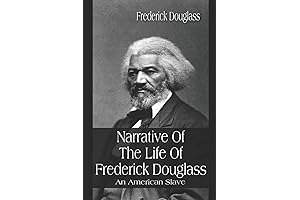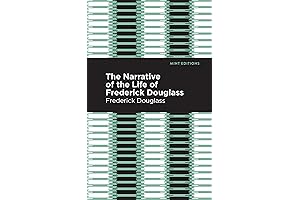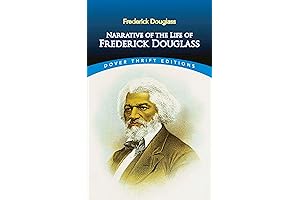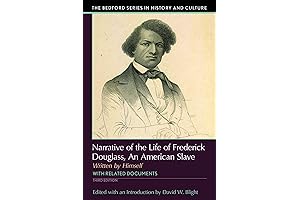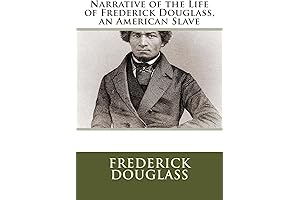· frederick douglass · 15 min read
Narrative of the Life of Frederick Douglass: An American Slave and Its Profound Impact
Dive into the gripping narrative of Frederick Douglass's life, an American slave who fought for freedom and became an influential abolitionist. Discover the captivating journey of his struggles, triumphs, and the enduring legacy he left behind.
Frederick Douglass's autobiography, 'The Narrative of the Life of Frederick Douglass, an American Slave,' stands as a timeless testament to the resilience of the human spirit. Join us as we embark on a journey through his life, exploring the horrors of slavery, the power of education, and the transformative impact he had on American history.
Overview

PROS
- Paints a vivid picture of the horrors of slavery.
- Shows the indomitable spirit of Frederick Douglass.
- Inspires hope and a determination to fight for justice.
CONS
- Some readers may find the descriptions of slavery too graphic.
- The book can be difficult to read at times due to its subject matter.
Frederick Douglass's Narrative of the Life of Frederick Douglass: An American Slave is a powerful and moving account of the horrors of slavery and the fight for freedom. Douglass was born into slavery in Maryland in 1818, and he spent his early years as a slave on several different plantations. He was subjected to beatings, whippings, and other forms of abuse, and he witnessed the horrors of slavery firsthand.
Despite the hardships he faced, Douglass never gave up hope. He taught himself to read and write, and he eventually escaped from slavery and became a leading abolitionist. His Narrative is a powerful indictment of slavery, and it is still relevant today as we continue to fight for racial justice. Douglass's story is a reminder that one person can make a difference, and that even in the darkest of times, there is always hope for a better future.

PROS
- Poignant and deeply personal account of Douglass's experiences as an enslaved individual
- Offers unique insights into the horrors of slavery and the resilience of the human spirit
CONS
- May be challenging for some readers due to its graphic descriptions of violence and oppression
- Historical context may require additional research to fully appreciate the significance of events
An Unforgettable Narrative
Frederick Douglass's autobiography, 'Narrative of the Life of Frederick Douglass, an American Slave,' stands as a powerful and moving account of his journey from bondage to freedom. Douglass's vivid prose transports readers into the depths of slavery, exposing its brutality and the resilience of those who endured it.
From his harrowing experiences as a young slave to his eventual escape and pursuit of education, Douglass unveils the horrors of slavery with unflinching honesty. His ability to articulate the physical and psychological toll slavery inflicted is both eye-opening and deeply affecting, inviting readers to confront the realities of this dark chapter in American history.

PROS
- Unveils the raw realities of slavery, offering a poignant perspective from a first-hand account.
- Presents a captivating narrative that explores the complexities of identity, resilience, and the pursuit of freedom.
CONS
- May evoke discomfort or emotions due to the graphic depiction of slavery's horrors.
- The language reflects the societal norms and attitudes of the era, which may differ from contemporary perspectives.
Immerse yourself in the searing memoir of Frederick Douglass, an American slave whose indomitable spirit and quest for freedom ignited a nation's conscience. Narrative of the Life of Frederick Douglass stands as a timeless masterpiece, capturing the harrowing realities of slavery through the eyes of one who endured its brutalities. Douglass's words resonate with both historical significance and a poignant intimacy, as he recounts his journey from the depths of bondage to the transformative power of education and activism.
This unflinching account transports readers into the heart of slavery, bearing witness to the dehumanizing treatment, physical abuse, and psychological torment inflicted upon African Americans. Yet, amidst the darkness, Douglass's indomitable spirit shines through. His thirst for knowledge, his unwavering resilience, and his unwavering belief in the inherent dignity of all humans serve as a beacon of hope and inspiration. Douglass's narrative transcends the confines of a personal story, becoming a powerful indictment of slavery and a testament to the indomitable spirit that resides within us all.
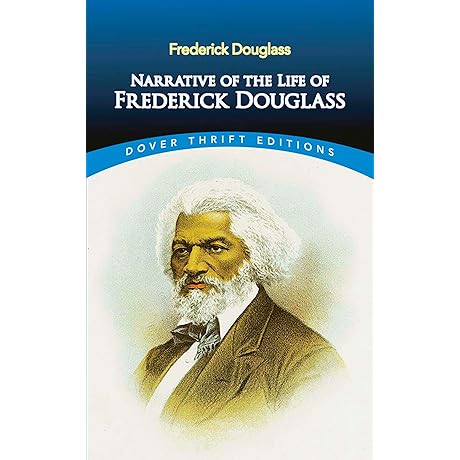
PROS
- Offers a firsthand account of the horrors of slavery in the 19th century.
- Provides a compelling narrative that sheds light on the resilience and determination of African Americans.
CONS
- The raw depiction of slavery's brutality may be disturbing to some readers.
- The narrative ends abruptly, leaving readers longing for a more comprehensive account of Douglass's life.
Immerse yourself in the gripping autobiography of Frederick Douglass, a former slave who rose to become a prominent abolitionist. This meticulously crafted narrative transports you back to the antebellum South, where the brutality of slavery unfolds before your eyes. Douglass's vivid prose and unwavering honesty lay bare the horrors he endured, from the physical and psychological torment to the dehumanizing treatment he faced. However, amidst the darkness, a beacon of hope emerges as Douglass recounts his relentless pursuit of freedom and his unwavering belief in the equality of all human beings. While the stark portrayal of slavery's horrors may unsettle some readers, it serves as a stark reminder of the atrocities that have shaped our history.
Beyond its historical significance, Narrative of the Life of Frederick Douglass stands as a testament to the indomitable spirit that resides within us all. Douglass's journey from slavery to freedom is an inspiration, reminding us of the transformative power of resilience and the importance of fighting for what we believe in. While the narrative concludes abruptly, leaving us yearning for a more thorough account of Douglass's later life, it nevertheless paints a vivid portrait of a remarkable man who left an indelible mark on American history.

PROS
- Unveils the horrors and injustices of slavery through Douglass's personal experiences
- Offers a powerful and moving narrative that sheds light on the struggles faced by enslaved people
CONS
- Graphic depictions of the brutality of slavery may be disturbing for some readers
- The language and style may be challenging for some contemporary readers
Prepare yourself for an unflinching and deeply moving account of life under the shackles of slavery in Frederick Douglass's Narrative of the Life of Frederick Douglass, An American Slave. Written in 1854, this powerful memoir narrates Douglass's journey from his horrifying childhood as a slave in Maryland to his ultimate escape to freedom in the North. The original 1854 edition, presented with annotations, offers an invaluable lens into the complexities of slavery, race, and freedom.
Douglass's narrative, imbued with eloquence and passion, recounts the harsh realities of his existence as a slave. From the physical abuse and dehumanizing treatment to the denial of basic rights, he vividly portrays the horrors that enslaved people endured. His firsthand experiences provide a profound understanding of the resilience and resistance of the enslaved, illuminating the deeply rooted injustices of slavery.
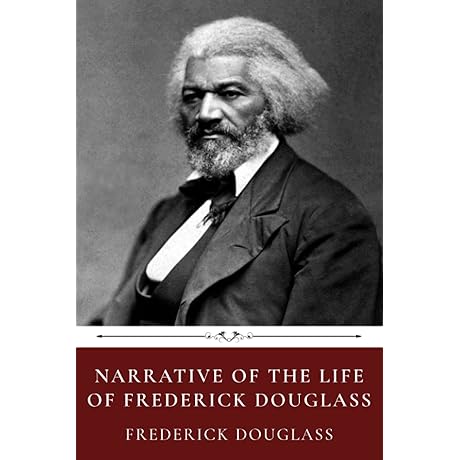
PROS
- Powerful first-hand account of slavery's horrors and the indomitable spirit of a courageous man
- Eloquent and moving writing that galvanizes readers to confront the horrors of the past and present
CONS
- Some may find the graphic depictions of violence disturbing
Frederick Douglass's autobiography, Narrative of the Life of Frederick Douglass, an American Slave, is a powerful and moving account of slavery's horrors and the indomitable spirit of a courageous man. Douglass provides a vivid and unflinching account of his life as a slave, from his childhood in Maryland to his escape to freedom in the North. His experiences are a testament to the brutality and dehumanizing nature of slavery and the resilience of the human spirit in the face of such adversity.
Douglass's writing is eloquent and moving, and his narrative is a powerful indictment of slavery. He exposes the hypocrisy of those who claimed to be Christians yet defended the institution of slavery. He also challenges the prevailing racial stereotypes of his time, arguing that African Americans were just as capable and intelligent as whites. Douglass's autobiography is a must-read for anyone who wants to understand the history of slavery in the United States or the struggles for racial justice that continue to this day.

PROS
- Offers a powerful perspective on the horrors of slavery and the indomitable spirit of one man
- Provides valuable historical context and insights into the experiences of enslaved people
CONS
- Some accounts may be difficult for sensitive readers
- The language used reflects the racial attitudes of the time and may be uncomfortable for some
A deeply moving and profoundly influential work, 'Narrative of the Life of Frederick Douglass' stands as a testament to the indomitable spirit of a man who overcame unimaginable hardships. Douglass's vivid firsthand account of his experiences as an enslaved person in the antebellum South offers a searing indictment of the institution of slavery and a poignant reminder of the resilience of the human soul.
Through Douglass's powerful prose, readers are immersed in the horrors of the slave system, witnessing the daily indignities, physical abuse, and dehumanization that he and countless others endured. Yet, amidst this darkness, Douglass's unwavering determination to gain his freedom and fight for the rights of all enslaved people shines through. His tireless efforts as an abolitionist and orator made him a beacon of hope for those still trapped in bondage.

PROS
- A powerful and moving account of the horrors of slavery.
- Douglass's eloquent prose and passionate voice shine through.
- An essential read for anyone interested in American history or the fight for racial justice.
CONS
- The graphic descriptions of slavery can be difficult to read.
- The narrative may be too emotional for some readers.
Frederick Douglass's Narrative of the Life of Frederick Douglass, an American Slave is a powerful and moving account of the horrors of slavery. Douglass was born into slavery in Maryland in 1818, and his narrative recounts his experiences as a slave in the South and his eventual escape to freedom in the North. Douglass's writing is eloquent and passionate, and his story is a testament to the resilience of the human spirit. Narrative of the Life of Frederick Douglass is an essential read for anyone interested in American history or the fight for racial justice.
Douglass's narrative is a powerful indictment of slavery, and it helped to shape the abolitionist movement in the United States. Douglass's story is also a personal one, and it offers a glimpse into the life of a man who overcame incredible adversity to become a leading voice in the fight for freedom. Narrative of the Life of Frederick Douglass is a must-read for anyone interested in American history, the fight for racial justice, or the power of the human spirit.

PROS
- Powerful and moving account of Frederick Douglass's life as a slave
- Offers a unique perspective on the horrors of slavery and the fight for abolition
- Well-written and engaging, providing valuable historical insights
CONS
- Some readers may find the descriptions of slavery disturbing
- Can be emotionally draining to read
Frederick Douglass's Narrative of the Life of Frederick Douglass, an American Slave is a powerful and moving account of his life as a slave in the United States. Douglass was born into slavery in Maryland in 1818 and spent the first 20 years of his life in bondage. During that time, he was subjected to the horrors of slavery, including beatings, whippings, and sexual abuse. Despite these hardships, Douglass never gave up hope of freedom. He learned to read and write, and he eventually escaped to the North. Once free, Douglass became a leading abolitionist and author. He wrote several books and articles about his experiences as a slave, and he spoke out against slavery throughout the United States.
Narrative of the Life of Frederick Douglass, an American Slave is a valuable historical document that provides a unique perspective on the horrors of slavery and the fight for abolition. Douglass's writing is clear and engaging, and his story is both heartbreaking and inspiring. This book is essential reading for anyone interested in the history of slavery in the United States.

PROS
- Dual narratives provide a comprehensive perspective on the horrors of slavery.
- Douglass's powerful narrative recounts his journey from enslavement to freedom, painting a vivid picture of the brutality and resilience of the human spirit.
CONS
- The graphic descriptions of abuse may be disturbing for some readers.
- The historical context is not extensively explored, leaving readers to seek additional resources for a deeper understanding.
Immerse yourself in the harrowing narratives of Frederick Douglass and Harriet Jacobs in this captivating anthology. Douglass's autobiography stands as a testament to the indomitable spirit of an enslaved man determined to reclaim his humanity. His account of the horrors he endured, from brutal beatings to the separation of families, is a sobering reminder of the dehumanizing nature of slavery.
Jacobs's parallel narrative offers a unique perspective from a woman forced into sexual servitude. Her resilience and resourcefulness amidst unthinkable circumstances serve as both an inspiration and a heartbreaking indictment of the system that oppressed her. Together, these narratives provide a powerful and nuanced exploration of the lived experiences of enslaved individuals, shedding light on the complex social and human dynamics that shaped the era of slavery.
The book recounts Frederick Douglass's harrowing experiences as a slave, from his childhood in Maryland to his escape to freedom in the North. Douglass vividly depicts the dehumanizing conditions, physical abuse, and psychological torment endured by slaves. Yet, amidst the darkness, he found solace in education, learning to read and write, and ultimately becoming a powerful voice for the abolitionist movement. His narrative not only chronicled the horrors of slavery but also showcased the indomitable strength and determination of those who dared to fight for their freedom.
Frequently Asked Questions
What is the central theme of Frederick Douglass's 'Narrative of the Life of Frederick Douglass, an American Slave'?
The central theme of Douglass's narrative is the dehumanizing nature of slavery and the indomitable spirit of those who fought for freedom. He exposes the brutality of the slave system while highlighting the resilience and determination of slaves who dared to resist oppression.
How did Frederick Douglass's education empower him in the fight against slavery?
Education became a transformative tool for Douglass. By learning to read and write, he gained access to knowledge and ideas that fueled his passion for freedom and justice. Education empowered him to articulate the horrors of slavery and advocate for the abolitionist cause.
What was the significance of Frederick Douglass's escape from slavery?
Douglass's escape from slavery in 1845 was a pivotal moment in his life and the abolitionist movement. It symbolized his triumph over oppression and provided him with the platform to share his experiences and advocate for the end of slavery.
How does Frederick Douglass's narrative contribute to our understanding of American history?
Douglass's narrative offers a firsthand account of the horrors of slavery and its devastating impact on individuals and communities. It provides invaluable insights into the struggles, triumphs, and resilience of enslaved people, enriching our understanding of American history and the fight for freedom and equality.
What is the enduring legacy of Frederick Douglass?
Frederick Douglass left an enduring legacy as a powerful voice for freedom and equality. His narrative and activism played a significant role in shaping the abolitionist movement and inspiring generations of civil rights activists. Douglass remains an iconic figure, representing the indomitable spirit of those who fought against oppression.
